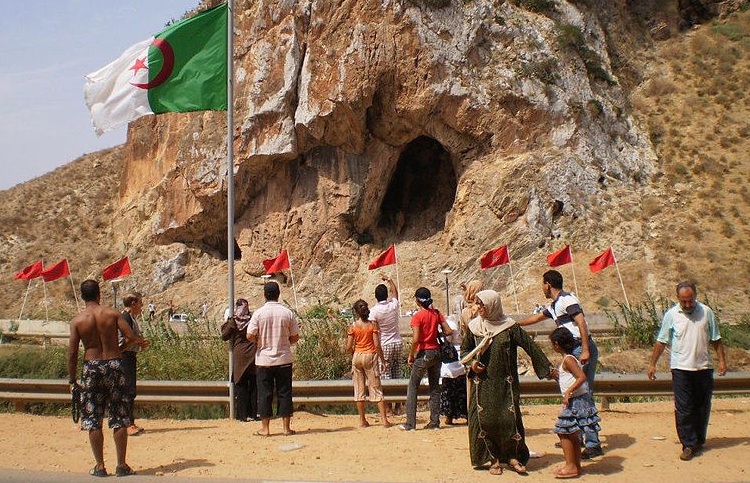The Diplomat
The Elcano Royal Institute believes that “it should not be ruled out” a “direct armed confrontation or with the involvement of the Polisario Front” between Algeria and Morocco and has warned, therefore, that Spain should contribute to lower the tension by promoting dialogue or, if not enough, “take more assertive and firm measures” in order to avoid “greater evils” against “national interests”.
“Spain and the European Union (EU) face a very complex neighborhood in 2022, with problems added to those that already existed before the pandemic,” highlights the Think Tank in the report Spain in the world 2022: prospects and challenges in the neighborhood, published at the end of December and prepared by the researchers Haizam Amirah Fernández, Ainhoa Marín, Mira Milosevich-Juaristi and Ilke Toygür.
According to the paper, “Spain’s southern neighborhood has become less stable and the first consequences are already being felt.” “The previous edition of this paper warned of the destabilizing effects of Donald Trump’s decision in December 2020 to unilaterally recognize Morocco’s sovereignty over Western Sahara – a territory that the United Nations considers ‘non-self-governing’ – in exchange for Rabat’s announcement that it was establishing full diplomatic relations with the State of Israel,” it continues. “Likewise, the danger of the two Maghreb powers, Algeria and Morocco, being engaged in an arms race and exhibiting an increasingly militant nationalism, directed mainly against their neighbor, was also highlighted,” it adds.
In this regard, according to Elcano, “the consequences of the escalation of tension and animosity in North Africa became more visible during 2021”, since, on the one hand, “the Western Sahara conflict has ceased to be a frozen conflict, as it was for 29 years until in November 2020 the Polisario Front broke the ceasefire with Morocco” because it considered that “the diplomatic route had not produced any results and that the process only served to consolidate the status quo favorable to the Moroccan position”. “In the current context, nothing seems to indicate that the peace process will be successfully reactivated, not even after the appointment, in October 2021, of Staffan de Mistura as the new personal envoy of the UN Secretary General for Western Sahara”, warns the Think Tank.
On the other hand, “the increase in regional tension manifested itself in the rupture of diplomatic relations between Algeria and Morocco in August 2021 and the subsequent non-renewal and closure of the Maghreb-Europe gas pipeline (GME), inaugurated in 1996 and which transported natural gas from Algeria to the Iberian Peninsula via Morocco”. In November, the Algerian presidency accused its neighbor to the west of ‘state terrorism’ following an attack – possibly by drone – in which three Algerian truck drivers were killed while crossing the Polisario Front-controlled area of Western Sahara. “Algiers announced that these killings would not go unpunished,” the report continued. “It had been at least four decades since the level of conflict between Algiers and Rabat had reached such high and dangerous levels,” it adds.
Implications for Spain
“For Spain, trapped in a delicate triangular relationship with its immediate neighbors to the south, this is very bad news”, firstly, because the closure of the GME affects the security of Algerian natural gas supplies to Spain, “reducing the number of gas pipelines in operation from two to one, leaving the one with the smallest capacity active”. Secondly, Spain is exposed to the pressures that its southern neighbors may decide to exert, immersed in a spiral of accusations, threats and hostile gestures that has no signs of abating in the near future. Moreover, the closer ties between Morocco and Israel in security and intelligence matters, which is seen as a “red line” by Algeria, threatens to further destabilize the Maghreb “if the intractable conflicts of the Middle East are imported into the Western Mediterranean”.
For all these reasons, according to the document, “the risk of escalation between Algeria and Morocco is real.” “Even if at the end of 2021 it does not seem the most likely, a direct armed confrontation or with the involvement of the Polisario Front should not be ruled out,” it continues. “Throughout 2022, an accidental or deliberately provoked spark could set North Africa on fire, destabilizing its Mediterranean and Sahelian neighborhoods,” and hence “the urgency of seeking ways of de-escalation to avoid greater evils,” it continues.
According to Elcano, “Spain, together with other countries with the capacity to influence the Maghreb, should seek to lower the tension between its southern neighbors and establish channels of dialogue”. “If this path does not produce results and the conflict puts national interests at risk, the Spanish government should adopt more assertive and firm measures, which would be more effective the more political and social support they have and the more coordination they seek at the European level,” it warns.







